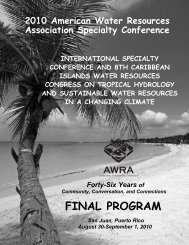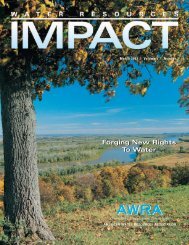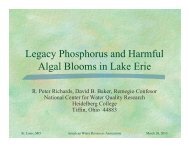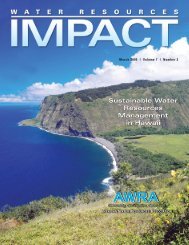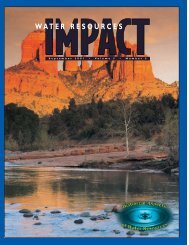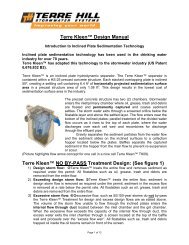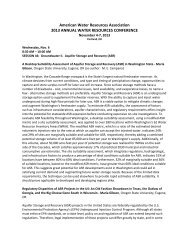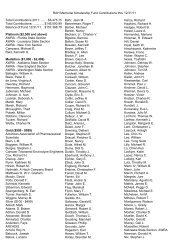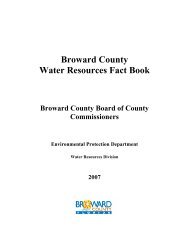N ovember 2 0 0 0 ⢠V olume 2 ⢠N umber 6 - American Water ...
N ovember 2 0 0 0 ⢠V olume 2 ⢠N umber 6 - American Water ...
N ovember 2 0 0 0 ⢠V olume 2 ⢠N umber 6 - American Water ...
You also want an ePaper? Increase the reach of your titles
YUMPU automatically turns print PDFs into web optimized ePapers that Google loves.
Army Corps of Engineers . . . cont’d.<br />
the older, shorter locks without stopping to unhook, thus<br />
sending smaller groups of barges through the locks while<br />
the others wait. Barge traffic often have waits up to 10<br />
hours, creating costly delays and the chance for more injuries<br />
to deckhands. In the newer 1200 foot locks near<br />
Alton, Illinois, the linked barges travel through the lock<br />
in about 25 minutes.<br />
Ron Fournier, a Corps spokesman in Rock Island,<br />
Illinois, said, "We do what’s best for the country and<br />
that’s not going to please everyone. We have not ignored<br />
the environment in any way." But environmental groups<br />
especially are unhappy with the proposal to expand the<br />
locks. Jeff Stein, with <strong>American</strong> Rivers, said, “Mother Nature<br />
has an incredible capacity to fix itself if we give it a<br />
chance. But we have to release some of the pressure<br />
being put on it. It’s a system on the brink and instead<br />
we’re proposing to do more to push it over.”<br />
In early October, the Corps requested a one year<br />
delay to redo its analyses because two North Dakota<br />
State University economists hired by the Corps to review<br />
the Mississippi River study concluded that the traffic<br />
forecasts used to do its analyses were not realistic as reported<br />
by the Washington Post. The economists cited numerous<br />
“flaws in the methodology” that are “tenuous at<br />
best.” Sweeney declared, “This is definitely a validation.<br />
I hope this means the Corps is going to stop cooking the<br />
books. I guess we’ll see.”<br />
Another report by Taxpayers for Common Sense<br />
(TCS) and the National Wildlife Federation claims the<br />
Corps wasted more than $6 billion of taxpayer money on<br />
beach restorations, flood control structures, and other<br />
water projects. It names 25 projects it claims are wasteful<br />
and lists the congressional supporters of each. The report<br />
is called Troubled <strong>Water</strong>s: Congress, the Corps of Engineers<br />
and Wasteful <strong>Water</strong> Projects and is available at<br />
www.nwf.org. Ralph DeGennaro, executive director of<br />
TCS, said, “Taxpayers should be outraged by this flagrant<br />
misuse of their money.” The groups claim the 37,000 employee<br />
agency is addicted to costly projects which often<br />
cannot be justified. Recommendations include:<br />
• Require the Corps to concentrate on its core missions<br />
of navigation, flood damage reduction, and<br />
environmental restoration.<br />
• Increase the local cost share for water projects.<br />
• Require the Corps to eliminate the low-v<strong>olume</strong><br />
maintained inland waterways.<br />
CORPS REFORM -SHORT LIVED<br />
In May of 2000, Louis Caldera, Secretary of the Army<br />
(a Clinton appointee) sent a letter to the Army Corps of<br />
Engineers announcing “reforms to strengthen civilian<br />
oversight and control over the Army Corps of Engineers<br />
civil works program.” The intent was to move control over<br />
the Corps from Congress to the Executive Branch but the<br />
attempt received intense disapproval in the Senate. (The<br />
Corps is an Executive Branch agency based in the Pentagon<br />
and run by military officers who report to civilians. It<br />
has enjoyed a close relationship with Congress because<br />
members typically endorse expenditures the Corps has<br />
planned for their districts.) Less than a week after issuing<br />
the directive, Caldera withdrew it.<br />
Courtney Cuff, a lobbyist for Friends of the Earth,<br />
said, “The senators feel like the Corps is their pot of pork<br />
to play with, and they don’t want anyone in their way.<br />
This is their way of killing reform and keeping the gravy<br />
train running.” The Army also weighed in on the proposal<br />
saying it was “unwarranted and unproductive.” A<br />
spokesman for Sen. Pete Domenici, R-New Mexico, said,<br />
[the senators] “want the Army Corps to stay the way it is.<br />
They want it to be accountable to Congress. They don’t<br />
want to shift so much to the administration.”<br />
AUTHOR LINK<br />
E-MAIL<br />
Gretchen Randall<br />
3712 N. Broadway PMB 279<br />
Chicago, IL 60613<br />
(773) 549-7850<br />
Fax: (773) 549-3198 or (231) 869-8800<br />
E-Mail: grandall@winningreen.com<br />
Gretchen Randall is a senior partner in an environmental<br />
policy consulting group, Winningreen LLC in Chicago.<br />
She also writes articles on various environmental subjects.<br />
❖ ❖ ❖<br />
StreaMSurvey ” ver. 7<br />
Now Available<br />
• Powerful, user friendly, Microsoft Excel based<br />
software for professionals working in stream and<br />
river geomorphological assessment and design.<br />
• Interactive worksheets include Cross-Section<br />
Surveys, Profiles, CX & Profile Overlays, Bed<br />
Material Characterization, Bank Erosion Analysis,<br />
and Field Form Templates.<br />
• Report ready plots and tables are immediately<br />
generated.<br />
• Comprehensive and helpful USER’S GUIDE<br />
included.<br />
• Adopted and well tested by government and<br />
private fluvial geomorphologists.<br />
For more details and ordering form<br />
see our website at<br />
www.streammetrics.com<br />
Setting a new standard in software for<br />
natural resources professionals<br />
6 • <strong>Water</strong> Resources IMPACT N<strong>ovember</strong> • 2000



